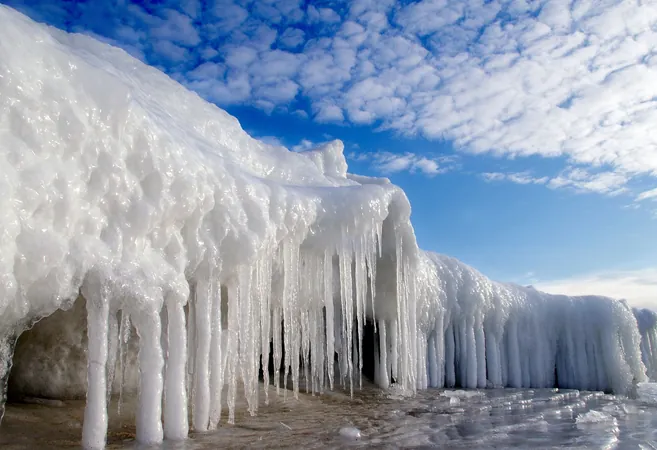
Alarming Discoveries: Antarctic Ice Sheet Melting Risks Exposed!
2024-12-11
Author: Yu
Recent findings about the Antarctic ice sheet have revealed disturbing patterns of sudden melting that date back over 20 million years, raising serious concerns in our current era of climate change. Conducted by an international team of geoscientists from the University of Leicester and the University of Southampton, this groundbreaking research sheds light on how sensitive the ice sheet was during Earth’s earlier ice ages and its implications for the future.
Unraveling the Mysteries of Ice Fluctuations
The Antarctic ice sheet has undergone significant expansions and contractions throughout geological history, reminiscent of a heartbeat. However, the discovery of varying melting patterns across different ocean regions has puzzled scientists for years. This anomaly suggests that the effects of ice changes should ideally reflect uniformly across ocean records—a notion that previous research could not entirely substantiate.
Scientists indicate that these fluctuations are intrinsically linked to Earth’s orbital eccentricity, which shifts over hundreds of thousands to millions of years. When Earth's orbit is more eccentric, the planet experiences increased solar heating, leading to rapid ice melting due to elevated temperatures. Conversely, a more circular orbital path allows for greater ice stability.
A Historical Perspective on Ice Sheet Instability
Focusing on the period from 28 to 20 million years ago—a time marked by higher global temperatures—researchers utilized geological cores collected during an Integrated Ocean Drilling Program (IODP) expedition. These cores, sourced from the northwest Atlantic Ocean, contain invaluable records of oxygen isotopes that track the growth and recession of the ice sheet.
Dr. Tim van Peer of the University of Leicester emphasized, “Our findings indicate that the Antarctic ice sheet’s past is much more unstable than previously assumed. This serves as a warning: if emissions remain unchecked, we are facing a significant loss of the Antarctic ice sheet.”
The Importance of Microbial Insights
In conjunction with geological analysis, researchers examined microorganisms trapped within sediment cores. These tiny organisms serve as historical indicators of ocean chemistry, allowing scientists to construct a timeline of ice behavior over millions of years. "It's astonishing that by analyzing minuscule fossil shells, we can glean insights into the pulse of the Antarctic ice sheet," noted Professor Paul Wilson.
This innovative approach not only enriches our understanding of historical climate patterns but also serves as a tool for predicting future changes.
Towards a Collaborative Understanding of Earth's Climate History
This multinational study emphasizes the necessity of collaboration in the fight against climate change, with contributions from scientists in the U.K. and Germany and backing from research councils and international marine programs. The IODP serves as a vital platform for exploring Earth's geological history through the analysis of seafloor samples.
Recent expeditions conducted by the University of Leicester have continuously advanced our understanding of the complexities of Earth’s climate systems, paving the way for more accurate climate models.
Key Takeaways for the Future
The research underscores an urgent need to address climate change proactively. Understanding the historical dynamics of the Antarctic ice sheet is crucial for predicting future scenarios and strategizing effective measures to mitigate runaway climate impacts. As scientists warn, the time to act is now—reducing greenhouse gas emissions is essential to maintain the fragile balance of our planet.
This sobering glimpse into our planet's history highlights how interconnected our climate systems are and the critical importance of safeguarding the Antarctic ice sheet for future generations. The study is detailed in the esteemed journal *Nature Communications*, calling for an urgent reevaluation of our approach to climate action and emissions reductions.
Stay Informed for Your Planet's Future!
For more insightful articles and updates on climate science, subscribe to our newsletter today! Don’t miss out on the information that could help shape a sustainable future for our planet.


 Brasil (PT)
Brasil (PT)
 Canada (EN)
Canada (EN)
 Chile (ES)
Chile (ES)
 España (ES)
España (ES)
 France (FR)
France (FR)
 Hong Kong (EN)
Hong Kong (EN)
 Italia (IT)
Italia (IT)
 日本 (JA)
日本 (JA)
 Magyarország (HU)
Magyarország (HU)
 Norge (NO)
Norge (NO)
 Polska (PL)
Polska (PL)
 Schweiz (DE)
Schweiz (DE)
 Singapore (EN)
Singapore (EN)
 Sverige (SV)
Sverige (SV)
 Suomi (FI)
Suomi (FI)
 Türkiye (TR)
Türkiye (TR)